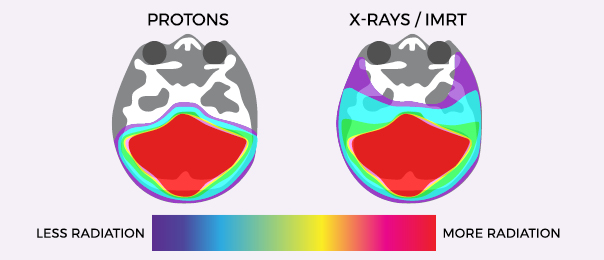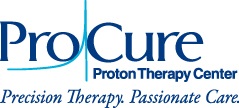proton therapy for pediatric cancers
Request a consultation about proton therapy cancer treatment
To learn more about proton therapy or to schedule a consult, please fill out the form below and someone will contact you to answer your questions.
What is Proton Therapy for Pediatric Cancers?
The Powerful Protection of Proton Therapy
Non-invasive and ultra-precise, proton therapy is proven to be a powerful weapon in a child’s fight against cancer. Proton therapy delivers radiation directly into the tumor, sparing harmful excess radiation to surrounding healthy tissue and organs.
The pinpoint accuracy of proton therapy is extremely valuable for children and teens given they are still developing and more sensitive to the effects of conventional radiation exposure. Proton therapy’s precise, controlled radiation doses lead to fewer short-term side effects during treatment and drastically reduces the risk of long-term side effects later in the child’s life.
Treating Pediatric Cancer with Proton Therapy in New Jersey
Children and teens require a cancer treatment that accommodates and adapts to their growing bodies. At ProCure, our leading team of experts works closely with patients, parents, and their wider care team to tailor a treatment plan unique to each child’s needs.
With the power of proton therapy, our doctors deposit highly controlled radiation doses directly into the child’s tumor, avoiding surrounding critical structures and vital organs. In contrast, conventional X-ray radiation passes right through the body, penetrating well beyond tumors and exposing healthy tissue to unnecessary, harmful radiation beyond the affected area.1,2
Proton therapy’s millimeter accuracy is especially advantageous for children and teens, who are much more susceptible to the damage caused by traditional X-ray radiation. With excess radiation minimized in proton therapy, pediatric patients are less likely to experience radiation-induced secondary cancers, cognitive impairment, developmental abnormalities, and growth delay. They can also complete treatment with fewer immediate side effects, enabling them to remain active and maintain their usual activities during treatment.

Proton Therapy vs X-Ray/IMRT for Pediatric Cancer
Proton therapy delivers less radiation to healthy organs than X-ray radiation, reducing the likelihood of side effects. These images show the areas of the brain exposed to radiation during treatment. Where standard X-ray treatment releases radiation from the moment it penetrates the skin and all the way through to the other side of the tumor, proton therapy deposits radiation directly into the tumor without exiting through surrounding healthy tissue.
Pencil Beam Scanning in New Jersey
ProCure uses the most precise form of proton therapy to treat pediatric cancers. Pencil Beam Scanning precisely controls protons to place the Bragg Peak, the point at which protons deposit their maximum energy, directly into the tumor. The acute precision of this technology makes it an ideal treatment for pediatric cancers, including irregularly shaped or complex tumors located next to critical tissues and organs.
Benefits of Proton Therapy for Pediatric Cancers
- Precisely targets the tumor, maximizing the radiation dose to cancer cells
- No exit dose minimizes radiation exposure, sparing surrounding healthy tissue and critical organs such as the brain, head, neck, spinal cord, heart, lungs, bowel, and other normal tissues1-4
- Lower risk of side effects such as cognitive impairment, developmental abnormalities, hormonal issues, and stunted growth
- FDA-approved treatment
- Lower occurrence of radiation-induced secondary cancer
- Utmost precision enables the most complex and irregularly-shaped tumors to be treated with greater accuracy
- Effective option for recurrent tumors, even in pediatric patients who have already received conventional radiation therapy
- Can be used in conjunction with other treatments such as surgery and chemotherapy
Is Pediatric Proton Therapy Right for My Child?
Proton therapy is often the preferred option for treating solid tumors in children. Protons can be precisely controlled to target the tumor and reduce radiation exposure to healthy tissue, preventing serious complications and reducing the risk of secondary tumors.1,3
The pediatric cancer tumors most appropriate for proton therapy include:
- Craniopharyngioma
- Ewing’s sarcoma
- Ependymoma
- Medulloblastoma
- Neuroblastoma
- Rhabdomyosarcoma
- Retinoblastoma
- Hodgkin’s disease
- Osteosarcoma
- Optic nerve meningioma
- Gliomas/astrocytoma
Base of skull tumors:
- Chordomas
- Chondrosarcoma
If you are interested in proton therapy as a treatment option for your child, call us to schedule a consultation and learn more about the many benefits of proton therapy for pediatric cancer. Our radiation oncologists are here to help you and your child with your treatment decisions.
Pediatric Cancers Treatment FAQs
Proton therapy is an advanced form of radiation that destroys cancer cells by preventing them from dividing and growing. Proton therapy uses protons—positively charged atomic particles—instead of the photons used in standard X-ray radiation therapy. With proton therapy, doctors can precisely target the tumor while minimizing damage to the surrounding healthy tissue. Unlike standard X-ray radiation, protons deposit much of their radiation directly in the tumor and then stop.
Depending on your child’s diagnosis, treatments are usually given 5 days a week for a period of 4 to 7 weeks. The time spent actually delivering the protons to the tumor is about 60 seconds, but a pediatric cancer treatment session can range from 60 to 90 minutes, depending on your child’s needs.
Yes. Proton therapy can be used in conjunction with or as a follow-up to other forms of treatments such as surgery, chemotherapy or conventional X-ray radiation.
The pediatric cancers ProCure treats include:
- Craniopharyngioma
- Ewing’s sarcoma
- Ependymoma
- Medulloblastoma
- Neuroblastoma
- Rhabdomyosarcoma
- Retinoblastoma
- Hodgkin’s disease
- Osteosarcoma
- Base of skull tumors:
- Chordomas
- Chondrosarcoma
- Optic nerve meningioma
If your child’s condition is not listed, they may still be a good candidate for proton therapy. Please contact the center to schedule a consultation and to find out more about the benefits of proton therapy.
Most insurance plans cover the cost of proton therapy for treating childhood cancers. Contact your insurance provider directly or call us for more information. ProCure has financial counselors who are dedicated to guiding you through the insurance process. They will happily guide you and answer any questions you may have regarding insurance coverage.
The good news is the vast majority of children treated for childhood cancers will be cured of their disease. Unfortunately, some childhood cancer survivors will later develop a new cancer as a result of their exposure to radiation, often decades after their initial treatment. Children are more likely to develop these radiation-induced secondary tumors than adults, and the risk is directly related to the amount of normal, healthy tissue that receives radiation.
Studies show that using proton therapy is likely to reduce the risk of radiation-induced cancers substantially, even when compared to the most sophisticated forms of traditional X-ray radiation, such as IMRT. Additionally, some experts have estimated that the risk of a secondary tumor with IMRT is at least 8 times greater than with proton therapy for children with medulloblastoma.5
In short, no. Proton therapy’s reduced radiation dose to normal tissues can also reduce the risk of other complications, such as developmental abnormalities. For example, proton therapy treatment for brain cancers can reduce the dose to critical structures, such as the hippocampus, hypothalamus, temporal lobes, and cochlea, compared to traditional (X-ray) therapy.6-9
Most pediatric patients have few, or very mild, side effects from proton therapy. If your child does experience any side effects, these can usually be managed with medications.
Since a patient receiving proton radiation therapy does not feel, see, or hear anything, the treatment is typically pain-free. As a result, most children will be able to lie still for the duration of the treatment. However, sedation is occasionally administered if we feel it’s necessary to ensure your child remains still during the treatment.
Most children are able to participate in normal activities before and after their daily treatments.
Many pediatric patients with cancer are good candidates for proton therapy. If you would like to better understand the use of proton therapy in your child’s treatment, we can schedule a consultation with a radiation oncologist. During the consultation, the radiation oncologist will discuss different treatment options with you and determine if your child is likely to benefit from proton therapy. The radiation oncologists at ProCure use various forms of radiation to treat pediatric cancer in addition to proton therapy, so they will provide you with a treatment recommendation for your consideration. For more information, please call us or Request More Information online.
There is currently one trial for pediatric cancer underway at ProCure:
– A multi-center registry of pediatric patients treated with proton therapy that compares the effects of chemotherapy in combination with hypofractionated proton radiation therapy.
For more information about this trial, please see Clinical Trials or contact the center.
Talk To Us
Find out if proton therapy is the right treatment for you. Contact our Care Team or request more information online.
Attend An Information Session
Learn more about proton therapy and our world-class Care Team. Contact the center to reserve your place.





